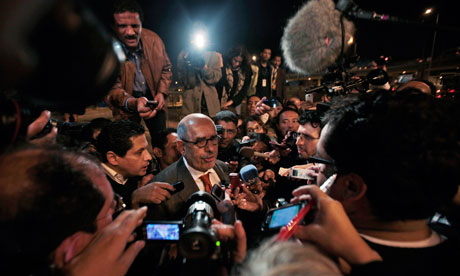Mohamed ElBaradei lands in Cairo: ‘There’s no going back’
by editor | 2011-01-28 6:58 am
![]()
Supporters insist Egypt’s people will make change from below [1]
[1]Jack Shenker in Cairo
-

Mohamed ElBaradei gives an impromptu press conference at Cairo airport, urging the Egyptian regime to exercise restraint with protesters. Photograph: Lefteris Pitarakis/AP Many in Egypt are accusing Mohamed ElBaradei of being a latecomer but in the end flight MS 798 from Vienna landed in Cairo 15 minutes ahead of schedule, carrying with it a man ready to assume the presidency.
Egypt’s beleaguered regime was waiting. Dozens of metal traffic barriers manned by plainclothes state security officers had been erected throughout the terminal to block the public from mobbing ElBaradei when he arrived, but they proved no match for the media scrum as the 68-year-old emerged with his wife. “Will you be on the streets tomorrow?” screamed one journalist. “Doctor ElBaradei, the people of Egypt need you tomorrow,” yelled a passer-by in Arabic.Hemmed in by a throng of cameras, ElBaradei had little choice but to give an impromptu press conference.
“This is a critical time in the life of Egypt and I have come to participate with the Egyptian people,” he said. “The regime has not been listening.
“If people, in particular young people, if they want me to lead the transition, I will not let them down. My priority right now … is to see a new regime and to see a new Egypt through peaceful transition.
“I advise the government to listen to the people and not to use violence. There’s no going back. I hope the regime stops violence, stops detaining people, stops torturing people. This will be completely counterproductive.”
Only a smattering of well-wishers made it down to greet ElBaradei, a far cry from the scenes last February when the former UN nuclear weapons chief was met by more than a thousand supporters at the beginning of his triumphant return.
Ahmed El-Sherif, a 24-year-old dentist, was one of the few to greet the Nobel peace prize winner this time round. “We are all Egyptians, and it’s our duty to receive ElBaradei in Egypt,” he said. “We need him to lead us to the change we want, for the regime to fall and Mubarak to leave and for a new, free Egypt to be born.”
El-Sherif rejected criticisms that ElBaradei had been too timid in the run-up to this week’s protests. “It’s not his job to be protesting on the streets, it’s our job. The people of Egypt will make the change from below, not ElBaradei. His role is to be a leader, a figurehead for what comes after, because that’s what we’re lacking at the moment.
“We do our job first, then he will do his.”
He added: “I was out on the protests on Tuesday, and I’ll be out on the protests tomorrow, which will be even bigger. What we’re witnessing before our very eyes is a dream come true. A lot of my friends have been crying, that’s how powerful this is.”
Abdul Rahman Yousseff, a poet who formerly coordinated a pro-ElBaradei campaign group, sought to play down expectations. “ElBaradei is arriving as an Egyptian citizen who wants to support his people, nothing more, nothing less,” he said. “Every Egyptian who stands with us tomorrow boosts our confidence, and he is no different.”
Yousseff denied that ElBaradei’s presence at the planned protests would afford demonstrators some measure of protection from police violence. “There’s no guarantee that he will bring us safety. If the regime feels under threat it may respond by attacking us more severely. Of course it would have been better if ElBaradei had been here from the beginning, but we understand that he has a lot of commitments. I have very high hopes for tomorrow’s protests.”
Others were explicitly critical of his late return. “ElBaradei has shown an exceptional lack of political insight; by not throwing his full support behind these protests from the beginning, he failed to predict how this situation would play out and that’s undermined him,” said Ayman Farag, a 32-year-old journalist who attended Tuesday’s protests.
“Is he coming for a photoshoot, or does he actually have something to offer? The fact is he’s done nothing concrete; the Egyptian people in the last 48 hours actually have done something, something which has shaken this regime far more than anything ElBaradei has ever done. Whatever happens from now on it will be nothing to do with ElBaradei; if he does get involved it will just look shallow and crass.”
- : http://www.facebook.com/sharer.php?u=http%3A%2F%2Fwww.guardian.co.uk%2Fworld%2F2011%2Fjan%2F27%2Felbaradei-return-cairo-egypt&t=Mohamed%20ElBaradei%20lands%20in%20Cairo%3A%20%27There%27s%20no%20going%20back%27%20%7C%20World%20news%20%7C%20guardian.co.uk&src=sp
Source URL: https://globalrights.info/2011/01/mohamed-elbaradei-lands-in-cairo-theres-no-going-back/